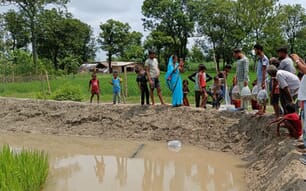Speaking at the event, Commissioner Damanaki said that the congress looked to the future, as does the Intergrated Maritime Policy.
"To secure a bright future, someone needs to have a vision. I am impressed with your own vision for joint action, built on a solid foundation of cooperation, to reach still greater heights. This mirrors exactly the approach we have taken to maritime policy-making. So you, indeed have a vision that I am sure will take shape during this important event. As the great Albert Einstein once said: “Logic will get you from A to B. Imagination will take you everywhere”. We stand ready to work with you to make maritime Europe a standard-bearer for ambitious policy-making.
"The EU has identified "blue growth" as a major priority for our Integrated Maritime Policy, with an emphasis on sustainable growth, employment and innovation. Thankfully, we will not be starting from scratch. Rather we will need to build on maritime Europe's proud track record due to efforts of our stakeholders and the maritime industry as a whole.
"So, going forward, our focus will be on playing to our strengths, while at the same time pinpointing new sources of real growth. This will mean identifying the untapped future potential of cutting-edge marine and maritime technologies, resources and services as drivers for innovation, competitiveness and, ultimately, growth and jobs.
"We are well on the way to doing this, as one telling example will show. We all know by now the benefits that maritime spatial planning can bring. What we haven't done is translate these benefits into figures.
"A recent independent study for the Commission has found that just reducing transaction costs, research, legal and administrative costs by Maritime Spatial Planning, by one per cent it could generate between EUR 170 million and 1.3 billion by 2020 depending on the level of conflicts of interest we have to face. And that's not all. If Maritime Spatial Planning can speed up investment in wind farms and aquaculture by one to three years, a further 60 to 600 million Euros could be generated by 2020. Of course, these are only assumptions. Even so this should spur us on to reach ever greater heights.
"Technological advances and innovation could bring huge benefits to industry and society as a whole on a lot of fronts. To take shipping as a first example, technology at the service of clean and energy-efficient ships, including sky-sails, alternative fuels and shore-side electricity supply, is a promising avenue to explore further. Green shipping is what we must aim at. The German shipbuilding industry, number one in Europe, has again set an example for us. How did this happen? By concentrating more on manufacturing high-quality specialised vessels and investing in research and development.
"The German government is also backing research and innovation in maritime sectors through its Programmes for "Shipping and marine technology for the 21st century" and "Innovative shipbuilding secures competitive jobs". I would also like to mention the support from the German Länder to maritime industries, for example through the common maritime cluster for the metropolitan region of Hamburg and Schleswig-Holstein. These are very welcome developments that I can only encourage.
"The potential is also there for technologies to help in exploiting renewable offshore energy sources. This is set to benefit a number of countries, including Germany, with its huge market for offshore wind energy.
"In tapping into the oceans' vast resources we must act responsibly and remember our duty as custodians of the planet. The oil spill in the Gulf of Mexico has taught us a bitter lesson on that score. Only by exploiting the Earth's resources sustainably can we secure lasting benefits for mankind.
"The potential benefit from our oceans is huge. The deep sea contains a wealth of largely undiscovered forms of life. Marine resources could be used for or inspire blue biotech developments. The Commission's upcoming Marine Knowledge 2020 proposal will seek to tackle some of these challenges by broadening our knowledge and making data more accessible and less costly for marine data users.
"Before I conclude I would just mention briefly that sustainability and greener policy-making also lie at the heart of current work to reform our Common Fisheries Policy.
"So the last step we must take is to dovetail maritime policy-making with the EU mainstream policy process, so that maritime policy makes the right contribution to the Europe2020 strategy and can use EU funding wherever possible to achieve its aims. Let me give here an example: next week we are going to launch research projects at almost 50 Million Euros for 2011 by EU funding in the call “Ocean of Tomorrow”.
"The EU’s Integrated Maritime policy is here to help and I am personally ready to take whatever steps are necessary to ensure seamless coordination between EU, national and regional action on this.
In these testing times the temptation is often for countries and sectors to become inward-looking and hesitant. But my call to you today is for us to do exactly the opposite. The global nature of the recession means that we are all in the same boat. If we all start pulling in different directions, we will end up going around in circles. But if we chart the same course, we will arrive at our destination more quickly."
Global Maritime Environmental Congress
EU - The first ever Global Maritime Environmental Congress was held earlier this week in Hamburg, Germany.


